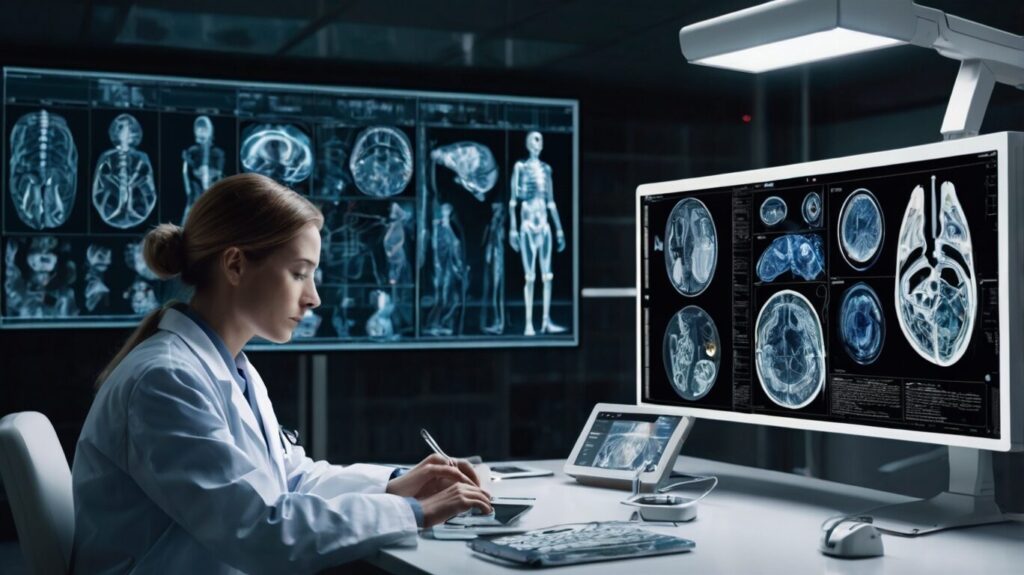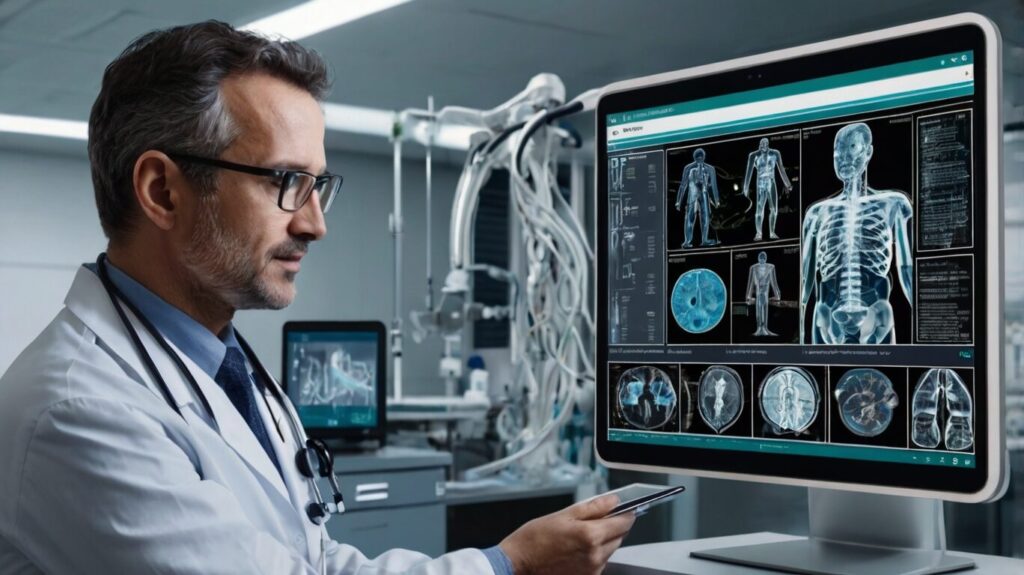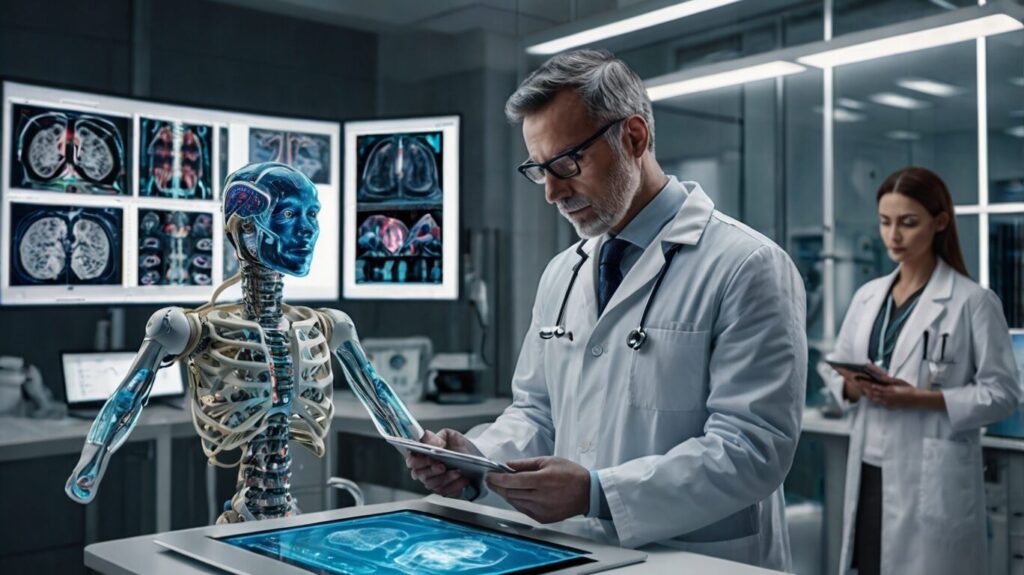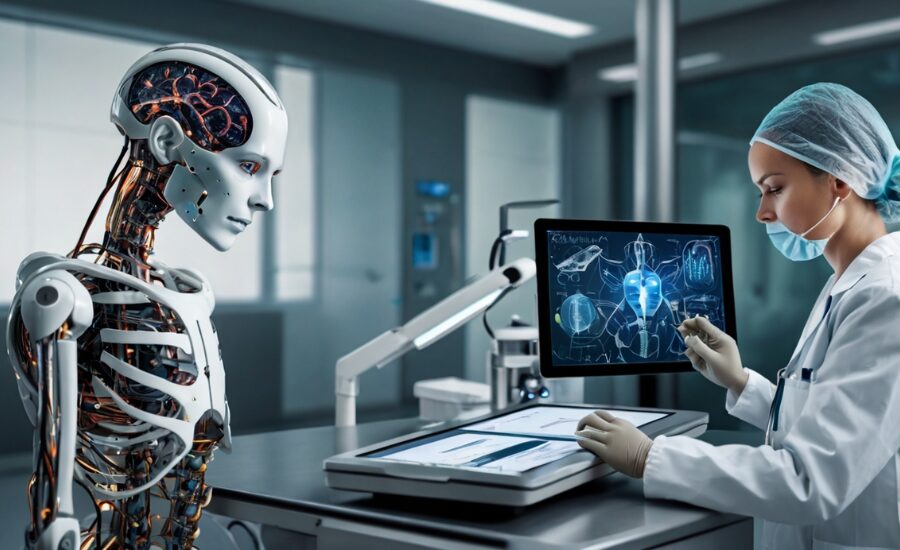Https://repositorio.ucsm.edu.pe/items/2b4c2be3-5884-4c6e-b6a1-5fc29d5a47ad & More
Introduction
https://repositorio.ucsm.edu.pe/items/2b4c2be3-5884-4c6e-b6a1-5fc29d5a47ad has an affect on the healthcare scene, introducing in a unused period of therapeutic headways. Counterfeit Insights (AI) is changing how healthcare experts analyze, treat, and oversee quiet care. This technology’s capacity to handle tremendous sums of information and distinguish designs past human capability is revolutionizing therapeutic hones over different specialties.
The integration of AI in medication offers various benefits, https://repositorio.ucsm.edu.pe/items/2b4c2be3-5884-4c6e-b6a1-5fc29d5a47ad from making strides demonstrative exactness to streamlining authoritative assignments. This article investigates the concept of AI in pharmaceutical, its applications in healthcare, and the focal points it brings to the field. By looking at these viewpoints, perusers will pick up bits of knowledge into how AI is forming the future of healthcare and its potential to improve quiet results and restorative efficiency.
What is Counterfeit Insights in Medicine?
Definition and Scope
https://repositorio.ucsm.edu.pe/items/2b4c2be3-5884-4c6e-b6a1-5fc29d5a47ad in medication alludes to the utilize of computer frameworks and innovation to reenact shrewdly behavior and basic considering comparable to that of a human being in healthcare settings . It has an affect on different viewpoints of quiet care, as well as regulatory forms inside supplier, payer, and pharmaceutical organizations .
AI in medication can be categorized into two primary sorts: virtual and physical. The virtual viewpoint incorporates applications such as electronic wellbeing record frameworks and neural network-based direction for treatment choices. The physical perspective includes robots helping in surgeries, cleverly prostheses for individuals with inabilities, and elderly care .
Historical Development
The https://repositorio.ucsm.edu.pe/items/2b4c2be3-5884-4c6e-b6a1-5fc29d5a47ad concept of AI in healthcare is not modern. The term “artificial intelligence” was to begin with coined in 1955 at a Dartmouth College conference . Be that as it may, AI applications didn’t enter the healthcare field until the early 1970s when inquire about delivered MYCIN, an AI program that made a difference recognize blood contamination medications .
Throughout the 1980s and 1990s, modern AI frameworks made a difference accomplish restorative progressions such as speedier information collection and handling, more exact surgical strategies, in-depth DNA investigate and mapping, and more comprehensive usage of electronic wellbeing records .
Key Components

AI in healthcare includes a few key technologies:
Machine Learning: This factual procedure fits models to information and “learns” by preparing models with information. It’s broadly utilized in accuracy medication to anticipate treatment conventions likely to succeed based on quiet traits and treatment setting .
Neural Systems: These complex shapes of machine learning, especially profound learning, are utilized for errands like recognizing possibly cancerous injuries in radiology pictures .
Natural Dialect Preparing (NLP): This innovation empowers computers to get it and translate human dialect. In healthcare, NLP is utilized for making, understanding, and classifying clinical documentation and distributed investigate .
Expert Frameworks: Based on collections of “if-then” rules, these frameworks have been broadly utilized for clinical choice back over the final couple of decades .
Robotic Handle Mechanization: This innovation is utilized for monotonous errands like earlier authorization, upgrading understanding records, or charging .
These https://repositorio.ucsm.edu.pe/items/2b4c2be3-5884-4c6e-b6a1-5fc29d5a47ad AI advances are reshaping healthcare by upgrading restorative conclusion, treatment, and investigate. They empower more precise analyze, personalized medications, and proficient examination of endless sums of clinical information .
Benefits of AI in Medicine
https://repositorio.ucsm.edu.pe/items/2b4c2be3-5884-4c6e-b6a1-5fc29d5a47ad has an affect on different angles of healthcare, advertising various preferences that are changing the restorative scene. These benefits span over distinctive zones, counting moved forward precision, improved proficiency, personalized care, and taken a toll reduction.
Improved Accuracy
https://repositorio.ucsm.edu.pe/items/2b4c2be3-5884-4c6e-b6a1-5fc29d5a47ad AI calculations have illustrated surprising capabilities in malady conclusion and location. These frameworks can analyze complex therapeutic information at uncommon speeds, essentially diminishing the rate of symptomatic blunders . In a few cases, AI calculations have appeared astounding precision, regularly outflanking prepared radiologists . For occurrence, in breast cancer location, AI hazard calculations can analyze standard 3D mammograms to distinguish designs recommending a person’s chance of creating forceful breast cancer inside the another 12 months .
Enhanced Efficiency
https://repositorio.ucsm.edu.pe/items/2b4c2be3-5884-4c6e-b6a1-5fc29d5a47ad AI computerizes various schedule assignments, from persistent planning to overseeing restorative records, which customarily require considerable human exertion and time . This computerization essentially decreases the time went through on documentation, information passage, and other schedule errands, liberating up healthcare experts to center more on understanding care . AI-enabled clinical decision-support frameworks may decrease demonstrative mistakes, increase insights to bolster choice making, and help clinicians with EHR information extraction and documentation assignments .
Personalized Care
https://repositorio.ucsm.edu.pe/items/2b4c2be3-5884-4c6e-b6a1-5fc29d5a47ad AI plays a significant part in optimizing treatment methodologies by considering different variables, counting persistent inclinations, asset allotment, cost-effectiveness, and clinical rules . The meeting of AI and accuracy pharmaceutical guarantees to revolutionize healthcare by empowering more personalized analyze, foreseeing infection hazard some time recently side effects happen, and planning customized treatment plans that maximize security and proficiency . AI approaches that exceed expectations at finding complex connections among a huge number of components give openings for fitting care to person patients .
Cost Reduction
https://repositorio.ucsm.edu.pe/items/2b4c2be3-5884-4c6e-b6a1-5fc29d5a47ad By streamlining forms, healthcare offices can decrease overhead costs and designate assets more productively, eventually diminishing the taken a toll of care for patients . Private payers may see noteworthy yearly investment funds of USD 80.00 billion to USD 110.00 billion over the following five a long time . Additionally, doctor bunches stand to spare between 3% and 8% of their costs, which may cruel an extra USD 20.00 billion to USD 60.00 billion in investment funds . These fetched diminishments are credited to different components, counting made strides diagnositc exactness, upgraded treatment adequacy, and operational efficiency.
Applications of AI in Healthcare

https://repositorio.ucsm.edu.pe/items/2b4c2be3-5884-4c6e-b6a1-5fc29d5a47ad has an affect on different perspectives of healthcare, revolutionizing how restorative experts approach determination, treatment arranging, medicate revelation, and therapeutic imaging. These progressions are changing persistent care and progressing healthcare outcomes.
Diagnosis and Illness Detection
AI calculations have illustrated surprising capabilities in illness determination and discovery. These frameworks can analyze complex restorative information, counting understanding history, side effects, and test comes about, to create personalized demonstrative proposals . AI-powered apparatuses can quickly collect and synthesize important data, making clinical proposals with a level of exactness and careful quality that outperforms human capabilities . This granular approach permits for more personalized quiet care planning.
In a few cases, https://repositorio.ucsm.edu.pe/items/2b4c2be3-5884-4c6e-b6a1-5fc29d5a47ad AI calculations have appeared surprising precision, regularly outflanking prepared radiologists . For occasion, in breast cancer discovery, AI chance calculations can analyze standard 3D mammograms to recognize designs recommending a person’s chance of creating forceful breast cancer inside the another 12 months . This capability is especially critical given that the miss rate for breast cancer with standard mammograms can be as tall as 35% .
Treatment Planning
AI plays a significant part in optimizing treatment methodologies by considering numerous components, counting persistent inclinations, asset assignment, cost-effectiveness, and clinical rules . AI-powered checking frameworks can track patients’ reactions to treatment in real-time, collecting and analyzing information from different sources such as wearable gadgets, electronic wellbeing records, and patient-reported results .
https://repositorio.ucsm.edu.pe/items/2b4c2be3-5884-4c6e-b6a1-5fc29d5a47ad These frameworks can help with determination and choices around treatment plans, but it’s critical to note that they are planned to back, not supplant, clinicians . AI can return experiences and suggestions, but healthcare experts still survey this data and draw their possess conclusions .
Drug Discovery
AI has the potential to revolutionize the medicate revelation prepare, advertising made strides effectiveness, exactness, and speed . Machine learning calculations can analyze huge sums of information to recognize designs and patterns that may not be clear to human analysts . This capability empowers the proposition of modern bioactive compounds with negligible side impacts in a much quicker prepare compared to classical conventions .
AI-based strategies have too illustrated the capacity to anticipate the poisonous quality of medicate candidates . Moreover, AI can help in distinguishing unused targets for sedate improvement, such as particular proteins or hereditary pathways included in maladies . This extends the scope of sedate disclosure past the impediments of customary approaches and may lead to the advancement of novel and more compelling drugs .
Medical Imaging
AI has appeared noteworthy precision and affectability in the distinguishing proof of imaging anomalies, promising to improve tissue-based location and characterization . For illustration, AI calculations can analyze complex therapeutic pictures such as X-rays, CT looks, and MRIs with tall accuracy and speed . These machine learning models are prepared to recognize designs, irregularities, and inconspicuous anomalies that may go unnoticed by human eyewitnesses .
In symptomatic imaging, AI has been effectively connected to consequently recognize complex designs and give quantitative evaluations of radiographic characteristics . This progression is moving radiology from a subjective perceptual aptitude to a more objective science . In any case, it’s imperative to note that whereas AI regularly recognizes minor picture modifications, the center ought to be on clinically significant occasions that influence quality of life, such as indications, require for disease-modifying treatment, and mortality .

Facts
- Historical Context:
- AI in healthcare began with MYCIN in the 1970s, an AI system for diagnosing blood infections.
- The integration of AI advanced significantly with the adoption of electronic health records (EHR) and precision medicine.
- Core AI Technologies in Healthcare:
- Machine Learning: Enables predictions and personalized treatment plans.
- Neural Networks: Used for pattern recognition in diagnostic imaging.
- NLP: Assists with clinical documentation and data extraction.
- Robotic Process Automation: Streamlines administrative tasks like patient scheduling and billing.
- Applications:
- Diagnosis: AI improves disease detection accuracy, e.g., breast cancer risk prediction through mammogram analysis.
- Treatment Planning: AI considers patient preferences, resources, and clinical guidelines for optimized care.
- Drug Discovery: Accelerates identification of potential drug compounds and toxicity testing.
- Medical Imaging: AI analyzes X-rays, CT scans, and MRIs to detect anomalies.
- Benefits of AI:
- Enhances diagnostic precision and efficiency.
- Supports personalized care through tailored treatment strategies.
- Reduces healthcare costs by optimizing processes and minimizing errors.
- Challenges:
- Dependence on high-quality data and robust algorithms.
- Ethical concerns and potential biases in AI models.
Summary
Your article explores the transformative role of Artificial Intelligence (AI) in the healthcare industry, highlighting its applications, benefits, and potential. It defines AI in medicine as the integration of computer systems to simulate human intelligence for improving patient care, operational efficiency, and clinical outcomes. The article outlines historical developments, technological components, benefits, and specific applications of AI, such as disease diagnosis, treatment planning, drug discovery, and medical imaging.
AI technologies like machine learning, neural networks, natural language processing (NLP), and robotic process automation are identified as key drivers behind AI’s success in healthcare. These advancements lead to improved diagnostic accuracy, enhanced efficiency, personalized care, and significant cost reductions.
The article also emphasizes how AI revolutionizes patient care by providing tools that complement healthcare professionals, such as predictive diagnostic systems, treatment optimization, and AI-assisted surgical tools. It concludes that while AI offers significant opportunities, human oversight remains critical to maximize its potential and mitigate challenges.
FAQs
- What is AI in medicine?
AI in medicine refers to the use of technology to simulate intelligent decision-making, aiding healthcare professionals in diagnosis, treatment, and patient management. - How does AI improve diagnostic accuracy?
AI algorithms analyze vast amounts of patient data to detect patterns and anomalies, often identifying diseases more accurately than traditional methods. - What are some examples of AI in healthcare?
- AI-assisted mammogram analysis for breast cancer risk prediction.
- Robots aiding in surgical procedures.
- NLP tools for clinical documentation.
- What are the benefits of AI in healthcare?
AI reduces diagnostic errors, streamlines administrative tasks, enhances personalized care, and lowers healthcare costs by optimizing resource allocation. - Are there risks associated with AI in healthcare?
Yes, risks include reliance on biased or incomplete data, ethical issues, and over-dependence on technology without human oversight. - Will AI replace doctors in the future?
AI is designed to assist, not replace, healthcare professionals. It complements their expertise, improving efficiency and decision-making. - How does AI contribute to drug discovery?
AI analyzes biological data to identify potential drug targets, accelerating the development of effective medications while minimizing side effects.
For more information About Anything visit Ideal Rular .com





